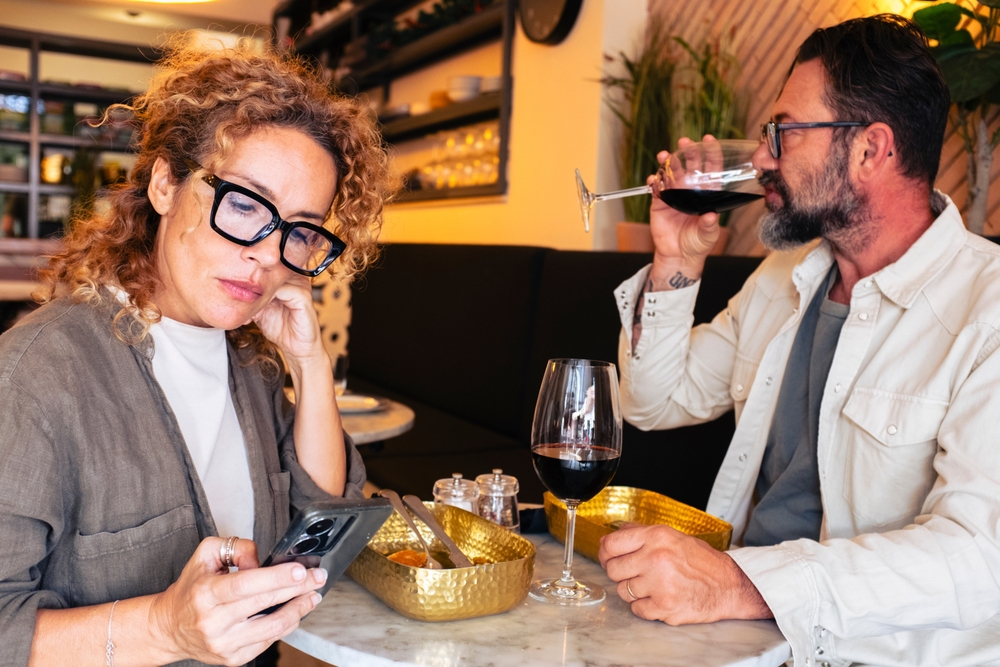Relationships evolve, and sometimes, you might feel a growing distance between you and your partner. This isn’t necessarily a bad thing, but it’s important to address it before it becomes a bigger issue. Remember, feeling disconnected doesn’t mean your relationship is doomed. It’s just a sign that you need to reconnect and rediscover the bond that brought you together.
1. Honestly evaluate your feelings and express your concerns to your partner.

The first step to resolving any issue is acknowledging it, Forbes notes. Take some time to reflect on what exactly is making you feel distant. Are there specific behaviors, lack of communication, or changes in interests that are contributing to this feeling? Once you have a deeper understanding of your own feelings, share your concerns with your partner in an open and honest conversation. Remember, communication is key in any relationship.
2. Schedule regular date nights or quality time together.

In the hustle and bustle of daily life, it’s easy to forget to make time for each other. Set aside dedicated time for just the two of you, whether it’s a weekly date night, a weekend getaway, or even just an hour each evening to chat and catch up. Use this time to reconnect, have fun, and remind yourselves why you fell in love in the first place.
3. Break out of your routine and try new things together.

If you feel like you’re stuck in a rut, doing the same things day in and day out, it’s no wonder you’re growing apart. Novelty and excitement are important for keeping the spark alive. Try a new restaurant, take a dance class, go on a hike, or plan a surprise weekend trip. Shared experiences create lasting memories and strengthen your bond.
4. Openly communicate your needs and expectations.

Sometimes, feelings of distance arise from unmet needs or unvoiced expectations. Have an honest conversation with your partner about what you need from the relationship, both emotionally and physically. Discuss your expectations for communication, quality time, intimacy, and support. Remember, your partner can’t read your mind, so it’s important to articulate your needs clearly and respectfully.
5. Prioritize intimacy and affection, both physical and emotional.

Physical touch, like hugs, kisses, and cuddling, releases oxytocin, the “love hormone,” which helps to strengthen emotional bonds. Make an effort to show affection regularly, even if it’s just a small gesture like holding hands or giving a back rub. Don’t neglect emotional intimacy, either. Share your thoughts, feelings, and dreams with your partner, and be there to listen and support them in return.
6. Find common interests and hobbies to pursue together.

Sharing hobbies and interests can bring you closer together and give you something to bond over. Whether it’s cooking, gardening, watching movies, or playing sports, find activities that you both enjoy and make time to do them together. This will create shared experiences and give you something to look forward to and talk about.
7. Learn to compromise and find solutions together.

Disagreements and conflicts are a natural part of any relationship. Instead of letting them drive a wedge between you, learn to compromise and find solutions together. Practice active listening, try to see things from your partner’s perspective, and be willing to negotiate and make concessions. Remember, you’re a team, and working together to overcome challenges can strengthen your bond.
8. Be willing to forgive and let go of past hurts.

Holding on to past grievances can create resentment and bitterness, which can poison a relationship, the Cleveland Clinic warns. If there are unresolved issues from the past, address them openly and honestly with your partner. If you can’t resolve them on your own, consider going to couples therapy. Learning to forgive and let go of past hurts is essential for moving forward and rebuilding trust.
9. Get professional help if needed.

If you’ve tried everything and are still struggling to bridge the gap, don’t hesitate to seek professional help. Couples therapy can provide a safe and supportive space to explore your issues, learn new communication skills, and develop strategies for reconnecting. A therapist can help you identify underlying problems, address unresolved conflicts, and guide you towards a healthier and happier relationship.
10. Celebrate your individuality and encourage personal growth.

Remember, being in a relationship doesn’t mean losing your sense of self. It’s important to maintain your own interests, hobbies, and friendships. Encourage each other to pursue personal goals and dreams. Celebrate your individual strengths and accomplishments. Supporting each other’s personal growth can actually strengthen your bond and create a more fulfilling partnership.
11. Practice active listening and show genuine interest in each other’s lives.

Communication is not just about talking; it’s also about listening. Make an effort to truly hear what your partner is saying, both verbally and non-verbally. Ask open-ended questions, show empathy, and avoid interrupting. Share your thoughts and feelings in return. By actively engaging in each other’s lives, you can create a deeper understanding and connection.
12. Show appreciation and gratitude for each other.

In long-term relationships, it’s easy to take each other for granted. Make a conscious effort to express your appreciation for your partner’s presence in your life. Notice the little things they do for you and say thank you. Compliment them, show affection, and celebrate their successes. Feeling valued and appreciated strengthens the emotional bond between you.
13. Be patient and give each other space when needed.

As Psych Central reminds us, everyone needs time alone to recharge and reconnect with themselves. Respect your partner’s need for personal space and encourage them to pursue their own interests. This doesn’t mean you’re growing apart; it’s simply a healthy way to maintain individuality within the relationship. When you come back together, you’ll be refreshed and ready to connect on a deeper level.
14. Be willing to change and adapt as your relationship evolves.

Relationships are not static; they change and evolve. As individuals, you’re constantly growing and learning. Be open to change and willing to adapt as your relationship progresses. This might mean trying new things, exploring different interests, or renegotiating boundaries. Embracing change can keep your relationship dynamic and exciting.
15. Remember that love is a choice, not just a feeling.

Love is not always a constant feeling of euphoria. Sometimes, it’s a conscious decision to choose your partner, even when things are challenging. It’s about commitment, compromise, and working through the tough times together. By choosing to love and invest in your relationship, you can overcome feelings of distance and build a stronger, more resilient bond.
Enjoy this piece? Give it a like and follow PsychLove on MSN for more!




